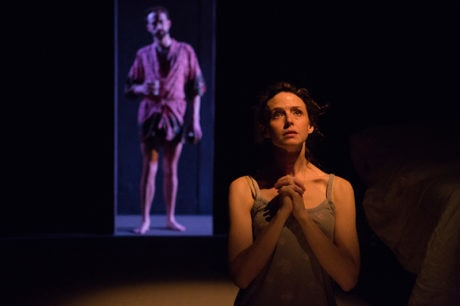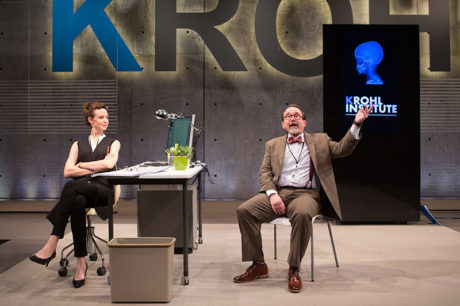Tom Stoppard’s The Hard Problem isn’t so much about consciousness and the existence of subjectivity, “the hard problem” elucidated by contemporary Australian philosopher David Chalmers, as it is about conscience and the human capacity to construct an ethical framework, a truly “impossible problem” (my own quotation marks).
The fact that Tom Stoppard can take such a weighty subject and make such an engaging hour and 45 minute play is a testimony not only to Stoppard’s genius as a playwright but also to theatre and its ability to explore deep mind-body relations.

To be sure, Studio’s excellent cast, headed by the Tessa Klein’s misty-eyed psychologist Hilary, are to blame for this production’s power, as each and every character in this play’s panoply of characters finds a place on Stoppard’s mind-body spectrum.
You see, at the grand level The Hard Problem debates the world’s greatest divide, that between spirit and matter, mind and brain.
At the topical level, that debate takes place over the source of consciousness, with the scientists arguing for a materialistic source of consciousness, i.e., the brain and its millions of neurons, and with the psychologists (or rather the play’s psychologist Hilary) arguing for a spiritual source of consciousness, i.e., Dualism, i.e., God.
Stoppard then does, however, what any master playwright might do: he roots that argument over the nature of consciousness in the world of our human conscience: good versus evil, self versus selflessness. The problem with that choice is that it leads Stoppard away from his intended subject: consciousness and its subjective experience of the world.
In other words, what heightens the ethical dimensions of the play, and thus its emotional aspects, lowers the focus on what gives consciousness its capacity to choose, to have subjective experiences, to become aware not only of the outside world but of our own inner self.
That said, Stoppard’s play engages not only intellectually but also emotionally.

Hilary, who is finishing up her degree in psychology, has a tutor (and eventual lover), Spike, a committed materialist played by Kyle Cameron, who does a great job making this supreme egoist a likeable character, even as he ridicules Hilary’s not-so-materialistic belief in altruism.
Hilary’s fascination with the spiritual dimension of consciousness is rooted in her own teenage pregnancy, a baby given up for adoption, and her inability to minimize the subjective importance of that act years later.
Hilary’s fascination lands her a job at the prestigious Krohl Institute, which is dedicated to research on consciousness. To get the job she beats out Amal, who like Spike is a materialist and supreme egoist. Shravan Amin does an excellent job giving dimensions to this relatively minor character of Amal, most notably a creeping sense of remorse.
As the rest of the story unfolds and the world of science merges with the world of finance, all the characters take their respective places on the egoism-altruism spectrum. As a result, the audience experiences the play’s intellectual debate within the emotional and physical tussle between characters.
When Hilary’s assistant, Bo, a refugee from the egoistical world of high finance where algorithms are king, collaborates with Hilary on an important study on psychology and conscience, the battle lines are drawn. Nancy Sun gives Bo an engaging yet steely delicateness.
The final significant character on this altruism-egoism spectrum is the Krohl Institute founder, the multimillionaire Jerry. David Andrew plays Jerry as the ultimate compartmentalizer. On the one hand he is capable of tyrannizing his employees for what is seemingly a minor mistake while, on the other hand, he demonstrates a remarkable forgiveness for mistakes that could truly damage the Institute’s reputation for years. Stoppard provides no explanation for Jerry’s seemingly stable erraticness, other than a possible respect for family.
Rounding out this excellent cast are Martin Giles as the empathetic Leo, Emily Kester as Pilates instructor Julia, Joy Jones as the brain researcher Ursula who also packs a punch, and Katie Beth Hall as Jerry’s precocious daughter Cathy.
And that it seems is the true “hard problem” of The Hard Problem. No matter how long we study human beings and their concurrent subjectivities, we are constantly struck by their inconsistencies, their babbling anomalies, and their out-and-out failure to behave in accordance with their best interests in mind.
Running Time: One hour and 45 minutes, with no intermission.
The Hard Problem plays through February 19, 2017, at The Studio Theatre – 1501 14th Street, NW, in Washington, DC. For tickets call the box office at (202) 332-3300, or purchase them online.
LINKS:
The Hard Problem at The Studio Theatre reviewed by Amy Kotkin.
In the Moment: The Studio Theatre’s The Hard Problem by David Siegel.
Magic Time! The Hard Problem at The Studio Theatre by John Stoltenberg.





